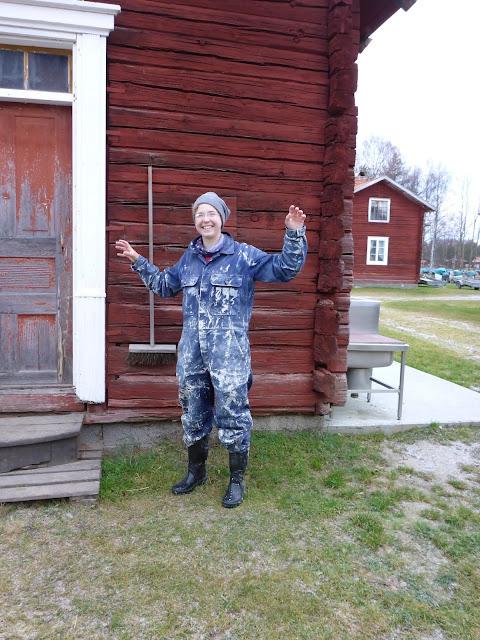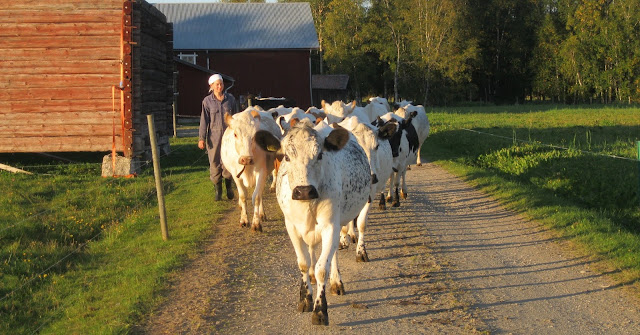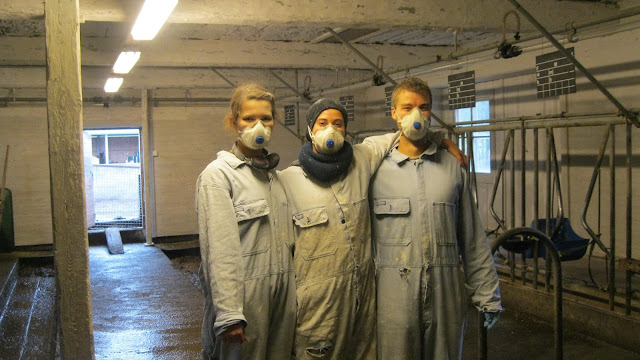"Chalk" Value!
This is Elisa, our Diminutive Dynamo from Germany
who was interning with us last year at this time on our farm.
She is modelling a haute couture chalk-drenched coverall,
in front of the Pump House,
just before going in to strip down and change.
This post will take you through the process that got her there,
and will introduce you to yet another miraculous event,
(and there were a lot of them on the farm that year)
that we have experienced.
This particular one pertains to
"The Wonderful World of Chalking"
and it's...
All good news!
Past years have found us every June striving to get:
all the new calves that were born in March, April and May
weaned, bottle trained, grain/hay fed, and
out into the front field safely to graze for the Summer and Fall,
the eco Kitchen Garden tilled, dunged, planned, planted,
and covered with fiberduk, which is that white webb-y stuff you have to
use in northern Sweden so that the seeds will actually germinate
when the soil is still pretty cold,
the Small Animal barn emptied of baby calves one group at a time, power-washed, along with the main barn, from ceiling-to walls-to floors in preparation for the chalking.
and finally,
ALL the milk cows who have been wintering in the main barn,
fully recovered from their calf-bearing, with their udders stabilized
and their milk production consistent,
going out every morning to the fields after milking,
and not coming in until the early evening for milking again.
That meant we could have about 8-10 hours
during the day to do the...
D-r-e-a-d-e-d C-h-a-l-k-i-n-g.
Even with all the cows out and the power-washing completed,
it felt like a daunting task to do by hand. Add to that the problem of the consistency of your chalk mixture. If you had it too thick when it dried it fell off the walls again in clumps and sheeted layers, if you had it too thin, it didn't cover properly.
Not good.


Working on the lower walls you could carry your bucket of liquid chalk with you. Working on the upper walls it was a larger bucket and a step ladder,
or if you were tall enough, you could sometimes do it from ceiling to floor
in one pass.
But no matter how you did it, the chalk mixture eventually made your nose itch - at the best of times - and sting - if you were particularly sensitive.
Witness "The Painting Mask Trio" pictured here.
An arduous task to say the least, and it usually took a full week , with a fair number of "drink breaks"
for the teams to accomplish it all.
But last year.....
Pappa looked again at an item he had seen several times before in one of the farm implement magazines. Made in Austria, it purported to be a
"Chalk Sprayer"
promising quick and even coverage,
with a minimum of mess/cleanup and
a maximum of speed/efficiency.
It was a bit pricey,
and more importantly,
unfamiliar to farmers in this area,
most of whom no longer chalk their barns.
That is because we are one of the few surviving "Family Farms"
in this region who milk 16-24 cows each day, use a bull instead of A.I.
and have their cows calf once a year in the Spring.
The great advantage of chalking the barns is that
it discourages insect pests, both flying and burrowing,
making it much more comfortable for the animals throughout the year.
We decided to give it a try, ordered it up,
and it arrived on the truck a few days later.
Enter the "FAB FOUR".
Left to right - Elisa - Germany, Melayne - USA, Shushy - Canada,
and Gibb - USA.
and Gibb - USA.
Here were their qualifications:
Elisa:
#1 - Spoke German so she could actually read the instructions.
#2 - Incredibly cheerful and intelligent, so she could understand the instructions.
#3 - Had a work ethic and a "can-do" mentality that would make Steve Jobs proud.
Melayne:
#1 - Ready and willing to do anything, even if it was new.
#2 - Strong enough to mix up the ensuing batches of chalk .
#3 - Detail oriented so she could check pressure, do walls, and mask.
Shushy:
#1 - Totally tall, and could reach places no one else could reach .
#2 - Tons of fun in any situation or challenge.
#3 - Never gave up no matter what.
Gibb:
#1 - Smart as a whip so he could figure out better ways of doing the job efficiently.
#2 - A champion at power-washing - fast and accurate.
#3 - A joy to be around and work with with his sparkling personality.
It was a win, win, win, win team.
With the four of them pitching in, the power-washing and wall prep work in the small animal barn were finished super fast .
Next was the masking, the most time-consuming part
as the ceiling is very high.
In the picture above you can see some of it on the walls.
Then Pappa stirred up the first batch of the chalk mixture, showing an example and making sure it was correct, and filling the big, blue barrel.
Once that was ready, Elisa started with the spraying of the ceiling
('always do the worst first'),
then moved on to the upper walls, then down to the lower walls.
Both Gibb and Shushy had to leave the farm before the spraying part was finished. He went home with his Dad to the U.S.A. and she went on to the next leg of her Swedish trip with her relatives.
That left Melayne and Elisa plowing on together and look at the result!
A work to be proud of !
Going from a main-barn interior that looked like this.....

to one that looked like this seemed almost like a miracle! And truly it was....
But in the end result, we happily
"Chalked" it up
to a job...
VERY WELL DONE!
"Chalked" it up
to a job...
VERY WELL DONE!










































